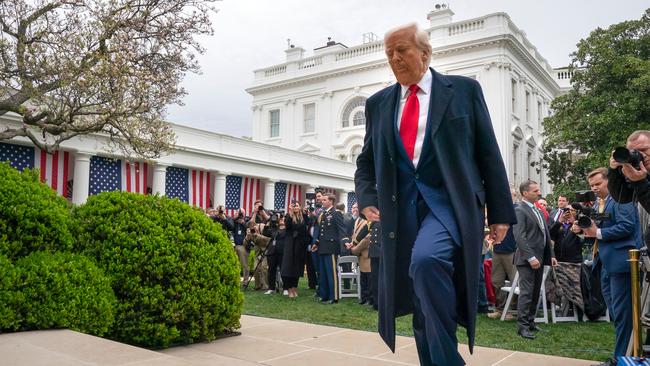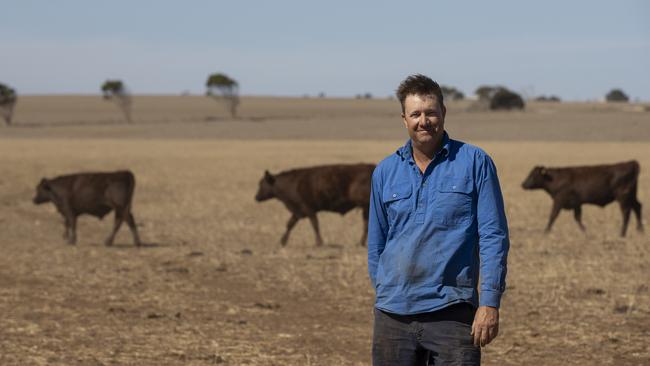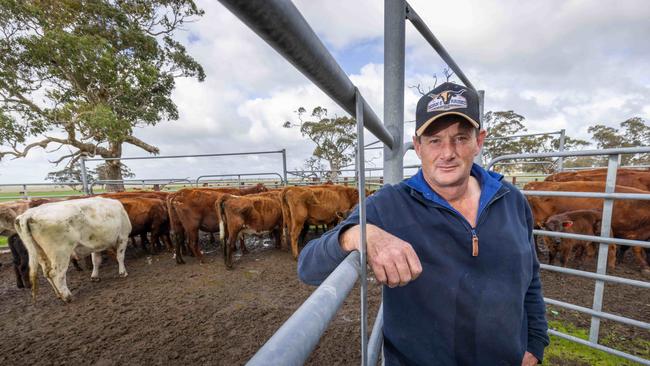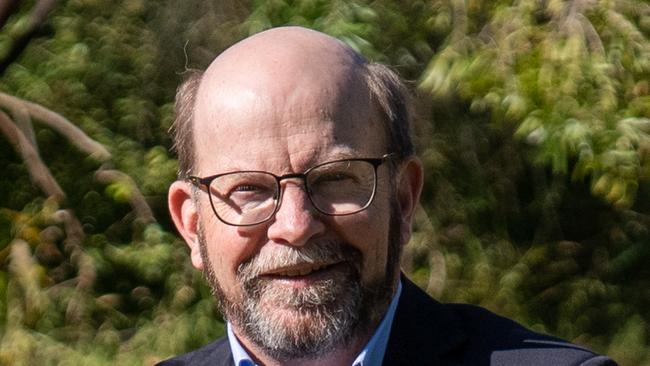Uncertainty for South Australian producers after Trump’s ‘Liberation Day’ beef bombshell
US President Donald Trump has hit Australia with a base tariff rate of 10 per cent, however Australia’s beef industry could take a much bigger hit.
SA News
Don't miss out on the headlines from SA News. Followed categories will be added to My News.
US President Donald Trump has hit Australia with a base tariff rate of 10 per cent, however Australia’s beef industry could take a much bigger hit.
Trump – addressing the world from the White House on what he has dubbed “Liberation Day” – took aim at Australia and its current beef export/import practices, but his words have left industry leaders confused.
“They’re wonderful people and wonderful everything, but they ban American beef,” Mr Trump said.

“Yet, we imported $3 billion of Australian beef from them just last year alone. They won’t take any of our beef. They don’t want it because they don’t want it to affect their farmers.
“And you know what? I don’t blame them, but we’re doing the same thing right now.”
SA farmers react to new beef tarrif
A Yorke Peninsula beef producer who has had to sell off more than half his cattle because of the drought says a new tariff on Australian beef is another kick in the guts.
Peter Wilson, 54, is an eighth-generation farmer whose property near Brentwood received just 180mm of rain last year, less than half of its long-term average.
This time last year, Mr Wilson was running about 400 cows but he is now down to less than 200 because of a lack of water and feed for the stock.

“I thought it might have been worse, actually, because I know America imports a lot of Australian beef,” he said. “So although it’s certainly not a good result, it could have been worse.
“I guess it will mean an initial price reduction for cattle markets in general... it’s a kick in the guts, really.”
Lucindale district cattle and sheep producer Anthony Hurst said he would prefer not to have the US tariffs, but he was confident the industry was strong enough to work within the new parameters.
“No-one likes tariffs, but at the same time you have to look at the positives of what Australia has done within our beef sector,” he said.
“We’ve promoted ourselves as a clean, green high-performing protein, not just to America. We’ve got huge access and capabilities of going into other world markets.
“So my initial reaction this morning wasn’t doom and gloom.”

The drought has forced Mr Hurst to cut his cattle numbers from 600 to 400 in the past two years. He said the new US tariff was “probably not something farmers needed” in the middle of a drought.
“But in the big scheme of things for a producer going through a tough season like we are, is this, in the short-term, going to affect them?” he said “No, it is not going to make any difference. It’s just something else to get their mind occupied.”
Livestock SA chief reacts to beef tarrif
Livestock SA chief executive Travis Tobin said the US could potentially suffer from the hardline tariff decision as Australia’s beef exports filled gaps in its supply.
“Their herd at the moment is at a 70-year low because of drought,” Mr Tobin said.
Australian meat was also vital to key products with its lean beef being used as a blend with US higher-fat offerings to produce burgers for example.
“Quick estimates showed that for six billion hamburgers consumed each year in the US there will be a $180m tariff cost to US consumers each year,” Mr Tobin said.
He said the US was South Australia’s largest export market for beef and sheep meat last year at 45 per cent and while the new tariffs “are not the end of the world” they were deeply disappointing.
“We have operated under a 20-year partnership on the trade agreement, there has been decades of building and cultivating that relationship,” Mr Tobin said.
“Australian red meat actually contributes to a stable supply for the US.”
SA also has strong export markets in Japan, China and South Korea, Mr Tobin said once the industry could work through the current announcements there was opportunity to look toward growing those relationships.
He cited the European Union’s recent approach to Australia to renegotiate a free trade agreement wehn earlier US tariffs were announced.
“We don’t know how it’s going to play out, there’s no doubt there will be retaliatory action from other countries,” Mr Tobin said.
Primary producers SA chair Simon Maddocks told FIVEAA Trump’s comments were “ a bit of a head spin” and it was unclear what the US President’s intentions were for Australian beef.
“I watched the presentation from the White House this morning, it’s very clear we have a 10 per cent baseline impact across the board … then the comments that he made about Australian beef, it’s a bit hard to understand,” he said.

“He talked about us banning US beef back in 2003 and that was because of mad cow disease, and so for us, it’s a biosecurity issue.
“But he then made this comment, well, we’re going to do something similar from midnight tonight – now, does that mean that we’re also going to have additional tariffs on US beef?,
“Is the interpretation that he’s going to ban Australian imports?
Latest data showed SA sent $302.5m worth of beef meat to the United States in the year to November 2024.
South Australia’s largest private company Thomas Foods International, which employs nearly 2000 skilled workers in SA, distributes more than 100 million pounds of quality meat products a year.
Darren Thomas, Managing Director of Thomas Foods International, said in September last year the USA was a “critical market for Thomas Foods International” and the company’s investment in the region reflected a “long-term commitment to providing high-quality Australian beef and lamb to American consumers”.
He declined to comment today.
More Coverage
Originally published as Uncertainty for South Australian producers after Trump’s ‘Liberation Day’ beef bombshell
Read related topics:Donald Trump




